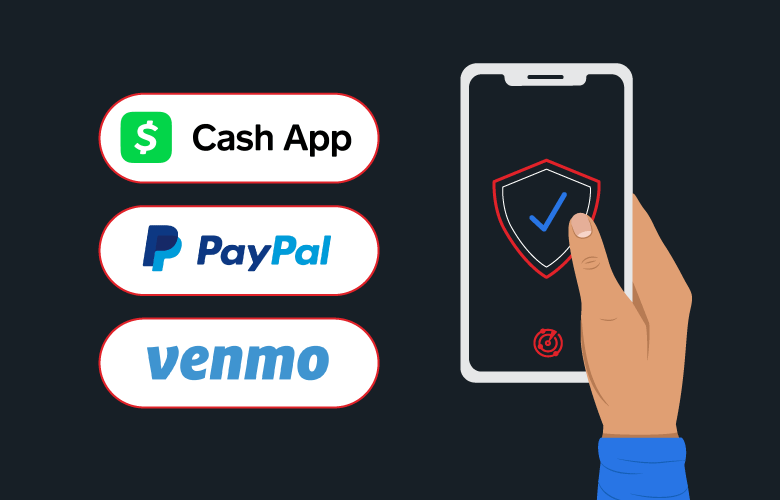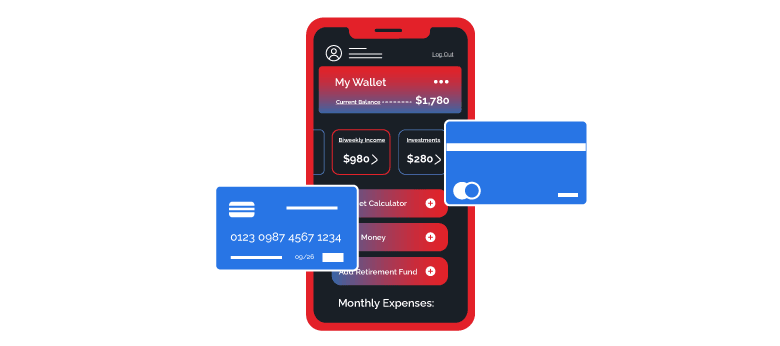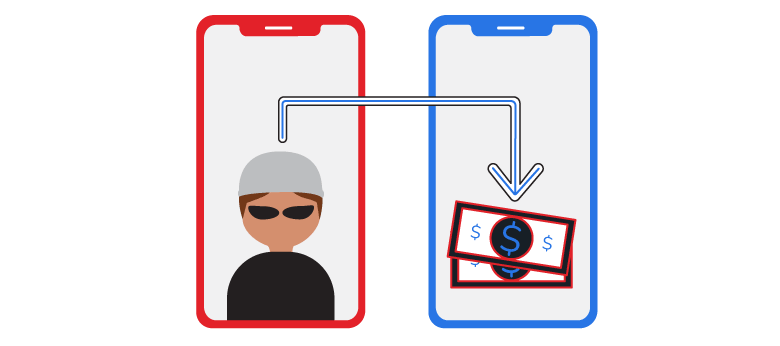May 8, 2022
A Beginner’s Guide To Digital Wallets 2025
We saw the biggest digital transactions spike in 2020. Yet, the writing was already on the wall for [...]

WHAT’S IN THIS REVIEW?
Disclaimer: Partnerships & affiliate links help us create better content. Learn how.
I remember the days when friends would remind me, “Hey, you still owe me money for that [purchase].” I’d feel guilty every time because reminding myself to grab cash was always as difficult as remembering what I had for lunch two days ago.
So, when Venmo came into the picture, I applauded its prime trait of convenience. No more would I have to run to the ATM to grab cash. Now, I can simply transfer money from my bank account to a friend’s with just a few taps on my phone.
Venmo, PayPal, Cash App, WorldRemit, and Zelle have rapidly developed a popular reputation for convenient transactions. But let’s get one thing straight, there are risks to using these apps—just like every other digital platform that stores sensitive information. So, let’s go over those risks, how secure these apps are, common scams on the rise, and tips to give you an extra sense of security when using them.

When operating any digital platform that stores your personal information, it’s crucial to be aware of the potential risks involved. Knowing the negative possibilities will keep you one step ahead of putting your money in harm’s way.
*Paypal does offer buyer-seller protection, but Venmo, Cash App, and, Zelle do not.
Generally, these apps are safe to use. They all use similar encryption standards to keep your personal information and money safe from dangerous parties. Below we summarize the security systems they have in place and how you can contact support with any questions.

Venmo’s security system stores sensitive information on servers in secure locations and uses encryption protocols to protect its users. Through an API, they’re able to provide a safe environment for users to complete digital transactions. When in a web browser, ensure “https” is in the URL and a lock icon is next to it. This is your sign that Venmo’s encryption protocols are turned on.
If you see any suspicious activity on your account, you should contact their support team right away. Since they do not offer buyer-seller protection, there may be little they can do to help.

Like Venmo, PayPal also uses a security system with high-standard encryption protocols and stores user data in secure server locations. What sets them apart is their ironclad buyer and seller protection agreement. For buyers, PayPal promises to reimburse when they do not receive an eligible item or the item does not match the seller’s description. For sellers, PayPal can help mediate the transaction if you receive the wrong payment amount or eligible items are not received by the buyer.
If you have any questions about their security system, access PayPal’s extensive resource center for answers and ways to contact them directly.

Cash App also uses encryption technology and secure servers to keep your data and transactions safe from hackers and scammers. As a PCI-DSS (Payment Card Industry Data Security Standard) Level 1 merchant, Cash App completes at least 1 million transactions each year—noting them as a widely accepted merchant who aims to protect users against the exploitation of personal information.
NOTE: To avoid scams, Cash App explicitly states, “They cannot guarantee a refund if you don’t receive what you pay for, it’s safer to send money over Cash App once you meet the buyer in person and receive whatever has been promised to you.”
For assistance, speak with a Cash App representative by contacting their team through the app, web, or phone.

If you’re looking for a secure way to send money internationally, WorldRemit is the app for you. They offer the ability to send money to Nigeria, India, the Philippines, the UK, and so many other countries worldwide. WorldRemit even secures and encrypts all device connections through its website and mobile app to keep your sensitive information protected.
If you witness any suspicious activity, their customer service team is available 24/7 to answer your calls and emails.

Zelle is a reliable app used to send money to a trusted individual with a bank account based in the US. They use strict authentication and monitoring features to keep your account and payments safe. These security features include firewalls, data encryption, information access authorization, and physical access controls.
If you need help using the Zelle app, you can reach out for assistance from their support team. And if you believe you’re a victim of a scam, fill out their form to immediately report it here.
Platforms like Facebook Marketplace and Craigslist make the process of buying and selling goods online so easy. These days, you can find almost anything you need, like cars, furniture, electronics, and musical instruments—their catalogs seem to never end.
But, transactions through these platforms require a money transfer app for the buyer and seller to exchange funds. Sometimes you’ll deal with people you trust but it’s common to interact with strangers through this process too. If you feel uneasy buying or selling to strangers, then we recommend using a money transfer app with a strict buyer and seller protection program. Out of PayPal, Venmo, Cash App, WorldRemit, and Zelle—PayPal is the only app that follows firm buyer and seller protection policies.

If it seems too good to be true, then it probably is. Engrain this in your mind now! Scammers are out there every day attempting to take advantage of Venmo, PayPal, Cash App, WorldRemit, and Zelle users and steal money from your accounts. If you encounter one of the scams below, then you are most likely a targeted victim and should not comply. Here are some of the most common online scams.
Scammers seek to fool money transfer app users by impersonating a customer support representative through texts, phone calls, or social media messages. To make themselves even more believable, they create fake websites and phone numbers that seem legitimate through a Google search.
They’re most likely trying to snatch up your passwords or PIN to access your account, so never respond to these messages or comply with their request!
According to the Better Business Bureau, reports have been made from Cash App users who lost thousands of dollars after speaking with an alleged customer support representative.
Another common scam taking place is when thieves create fake raffles for users to win cash prizes. These often ask you to send a few dollars or your login information to enter and it’s all a ploy to steal your hard-earned money.
If you want to enter any sweepstake from Venmo, PayPal, or Cash App, make sure you’re interacting with their “verified” social media accounts—which show a blue checkmark next to their username.
Amid the COVID-19 pandemic, scammers are trying to swindle kind donors out of their money. These fraudsters spin up fake grant programs and ask for payment to receive certain benefits. Again, do not interact with these requests! Also, watch out for natural disaster charities or relief programs that are “in need” of financial help to provide resources for displaced people.
Another popular scam taking place throughout social media apps is cash-flipping. Cybercriminals will promise to flip your money when you send them the funds through a money transfer app. In other words, if you send money they will claim to send you back double or triple the amount you gave.
Keep your money safe and only send funds to people you know. You have the upper hand, so don’t let strangers scam you out of hundreds of dollars.

Now that you are aware of the risks, security systems in place, and real-life scams, it’s time to equip yourself with the tips necessary to keep your money safe when using Venmo, PayPal, and Cash App.
Only trust people you know when sending and receiving money.
Update your money transfer app(s) when a new version is released or ensure you have automatic downloads turned on in your device settings. This will secure your software with the most recent security bug fixes.
Don’t let your received funds remain in your money transfer app(s). Transfer the money directly to your linked bank account, so the money is not vulnerable to theft.
Public WiFi connections are more susceptible to cyber attacks, so aim to complete digital transfers through a secure network.
Unlike a debit card, credit cards don’t have actual cash funds to access, so it’s a safer bet to use for money transfers.
A virtual private network (VPN) will provide an extra layer of security and will keep all of your data and digital wallet safe through the highest level of encryption and secure servers.
If you receive an email or text from Venmo, PayPal, or Cash App with a suspicious link, do not engage with it. These may seem legit, but they most likely link out to fraudulent websites to steal your money or account information.
It’s vital to routinely do this with any platform that stores sensitive information. Also, remember to change it to a password unique from other accounts you use.
This may include a PIN, face ID, fingerprint scan, and/or two-factor authentication.
If you’re very active on these apps, make sure you monitor these logs weekly to verify every transaction is legitimate.
If you see anything completed without your consent, contact your bank or credit card company and report the dispute to your money transfer app.
In case your phone is stolen or lost, no one can enter your device and access your apps.
Also known as an “e-Wallet,” a digital wallet is a cloud-based service that helps people to transact online. For example, any website or app you use to make a payment is considered a digital wallet. It’s common for individuals to use anywhere from 3-5 different apps at once.
Digital wallets usually come in the form of an app you can download on your smartphone or wearable device. You can use them at any participating store or website to make purchases. Online stores tend to accept a combination of wallets whereas only retailers that have a point of sale (POS) terminal can accept digital payments. Check out our Guide to Protecting Your Digital Wallet to learn more about the different types of technology each wallet uses.
In addition to credit and debit cards, digital wallets can also store:
Keep in mind that e-wallets can get cluttered, too. Be sure to “clean out” yours every few months to keep it organized.
The best VPN service will be one that provides strong security features like AES-256 encryption, a kill switch, and a verified no-logs policy. This will help keep your data safe from hackers and protect your transactions while on a secure server. We recommend using a premium VPN like NordVPN or IPVanish whose claims have been verified by independent security auditors.
There’s no doubt that Venmo, PayPal, Cash App, WorldRemit, and Zelle have revolutionized digital transactions. It’s easier and more accessible for people to receive and send money, but this convenience can come with a hefty price if you’re not smart about it. Keeping yourself one step ahead with our tips will help you stay safe from scammers and hackers attempting to steal your money.
If you’re interested in learning more about using a VPN, check out the best VPN providers for security and privacy—all tested and reviewed by our VPN experts.

Check out our NordVPN review for a complete pricing and feature breakdown.
WHAT’S IN THIS REVIEW?
| Cookie | Duration | Description |
|---|---|---|
| __cfduid | 1 month | The cookie is used by cdn services like CloudFlare to identify individual clients behind a shared IP address and apply security settings on a per-client basis. It does not correspond to any user ID in the web application and does not store any personally identifiable information. |
| cookielawinfo-checkbox-advertisement | 1 year | The cookie is set by GDPR cookie consent to record the user consent for the cookies in the category "Advertisement". |
| cookielawinfo-checkbox-analytics | 1 year | This cookies is set by GDPR Cookie Consent WordPress Plugin. The cookie is used to remember the user consent for the cookies under the category "Analytics". |
| cookielawinfo-checkbox-necessary | 1 year | This cookie is set by GDPR Cookie Consent plugin. The cookies is used to store the user consent for the cookies in the category "Necessary". |
| cookielawinfo-checkbox-non-necessary | 1 year | This cookie is set by GDPR Cookie Consent plugin. The cookies is used to store the user consent for the cookies in the category "Non-necessary". |
| cookielawinfo-checkbox-performance | 1 year | This cookie is set by GDPR Cookie Consent plugin. The cookie is used to store the user consent for the cookies in the category "Performance". |
| viewed_cookie_policy | 1 year | The cookie is set by the GDPR Cookie Consent plugin and is used to store whether or not user has consented to the use of cookies. It does not store any personal data. |
| Cookie | Duration | Description |
|---|---|---|
| cookielawinfo-checkbox-functional | 1 year | The cookie is set by GDPR cookie consent to record the user consent for the cookies in the category "Functional". |
| cookielawinfo-checkbox-others | 1 year | No description |